
Research and evaluation
We regularly conduct research on topics related to disadvantage in Australia and how to better support disadvantaged children, young people and their families.
Findings from our research help us to improve our policies and programs so we can make an even greater impact on the lives of the disadvantaged children we support. Research also informs our advocacy on behalf of disadvantage children and young people.
See some of our recent reports below.
Evidence underpins our programs and practice
The main focus of our research is the unique national longitudinal dataset of students on our Learning for Life scholarship program. We regularly collect demographic, administrative and educational outcomes data on all students on the program, who numbered close to 67,282 in 2023-24.
Our research aims to better understand what improves the educational outcomes of highly disadvantaged children and young people. The findings directly inform our programs and practice, and underpin our advocacy.
We also undertake large-scale, multi-year, innovative research with partner universities, governments and non-government organisations through the Australian Research Council (ARC) Linkage grants program.
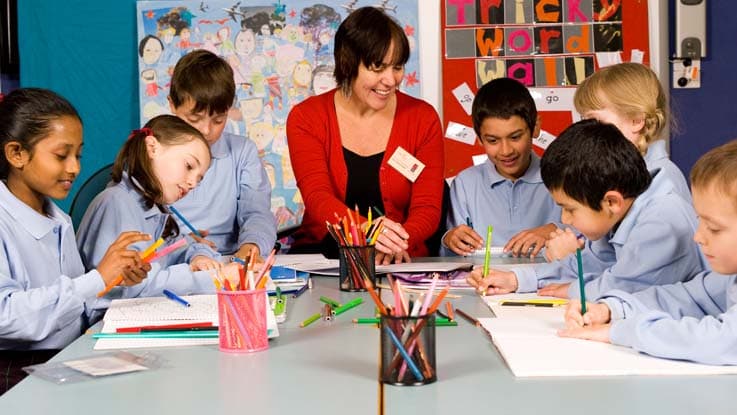
Research reports
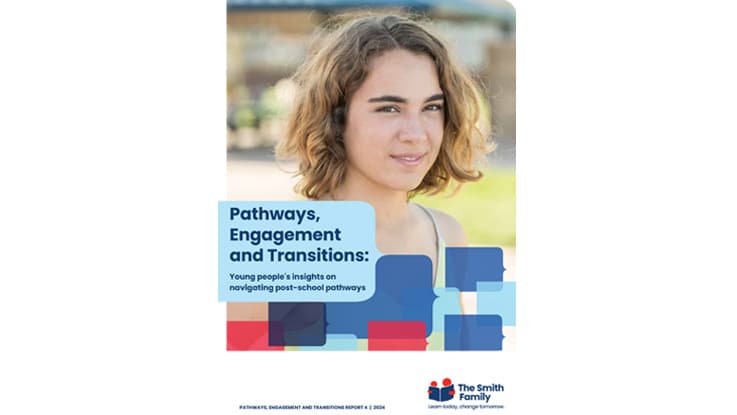
Pathways, engagement and transitions: Young people’s insights on navigating post-school pathways
This fourth Pathways, Engagement and Transitions (PET) report shares the stories of six young people who were in Year 12 in 2020 and on The Smith Family’s long-term educational scholarship program, Learning for Life.
As participants of the research project, they took part in three interviews conducted over 2021, 2022 and 2023. These interviews capture their experiences during secondary school and explore how their transitions into post-secondary education, employment, and training evolved over time.
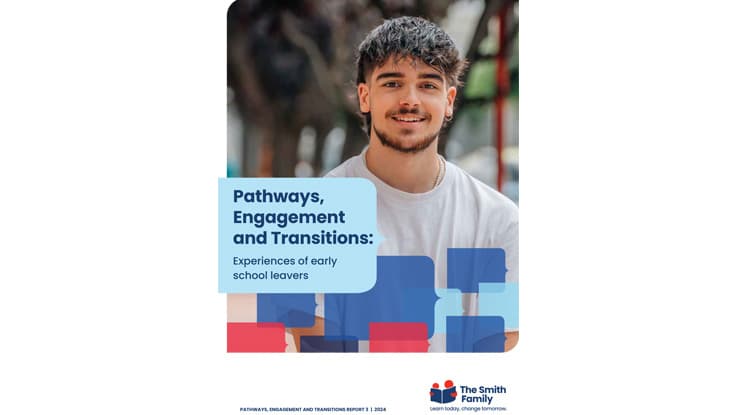
Pathways, Engagement and Transitions: Supporting more students experiencing disadvantage to have positive post-school pathways and complete Year 12
The latest publication from The Smith Family’s longitudinal Pathways, Engagement and Transitions (PET) research draws on three years of surveys of over 2,000 young people experiencing disadvantage who were in Year 10 in 2020 and in-depth interviews, to identify how more young people can be supported to complete Year 12 and have positive post-school pathways. Research shows educational attainment is associated with positive social and economic outcomes across a person’s life and that those who leave school without completing Year 12 can find the post-school transition difficult. Over the last decade, school completion rates in Australia have seen at least one in five young people not finish Year 12. In 2022, as life returned to something more normal after the COVID pandemic, the completion rate dropped further with a quarter of young people leaving school without finishing Year 12. Young people experiencing socioeconomic disadvantage, or living with a disability, or who identify as First Nations, have lower rates of Year 12 completion on average, than their peers.
With nine in 10 new jobs expected to require post-secondary qualifications over the next decade, understanding the transition from school to study, training or work and how to support more young people to complete Year 12, is essential.
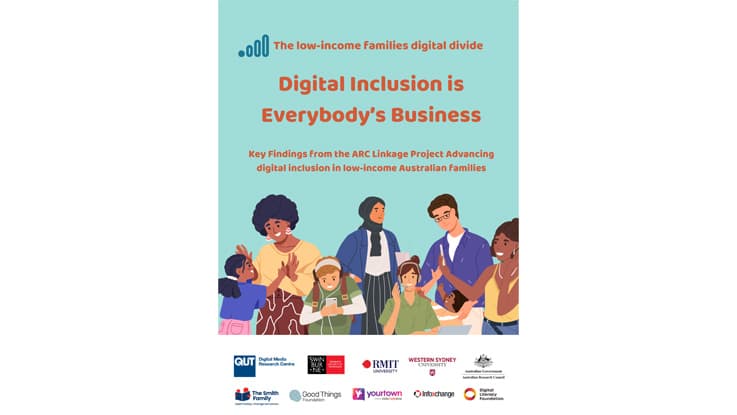
Key Findings from the ARC Linkage Project Advancing digital inclusion in low-income Australian families
The Australian Research Council Linkage Project (2021-2024), “Advancing digital inclusion in low income Australian families” focuses on the digital inclusion impacts on children’s home and school learning experiences, school leaver’s transitions into work, and parenting in digital times. It is a collaboration between Queensland University of Technology, Western Sydney University, Swinburne University of Technology, RMIT University, Good Things Foundation, The Smith Family, Yourtown, Infoxchange and the Digital Literacy Foundation.
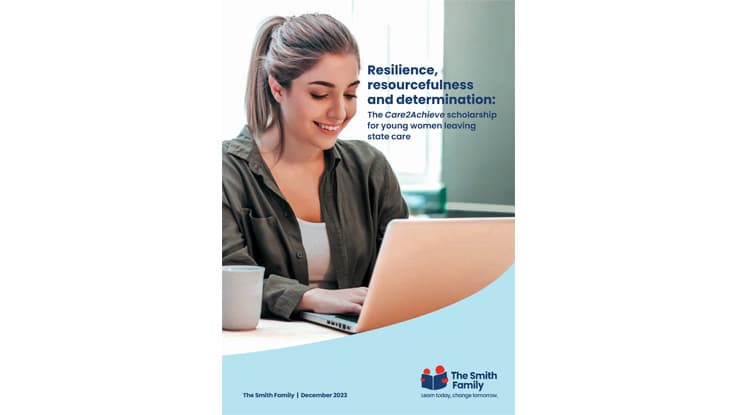
Resilience, resourcefulness and determination: The Care2Achieve scholarship for young women leaving state care
An evaluation on the pilot program designed to reduce the financial barriers in accessing and participating in Vocational Education and Training (VET) and/or university education as well as assist young women to develop the skills, confidence and networks to complete tertiary studies and increase young women’s prospects of becoming economically independent and having a more positive future.
The pilot evaluation showed promising evidence of the program’s capacity to support young women to complete tertiary qualifications. Half of all program participants (48 percent) completed a tertiary qualification during their time on the program – a completion rate that is comparable with the national four-year completion rates for students of all ages from low socioeconomic backgrounds.
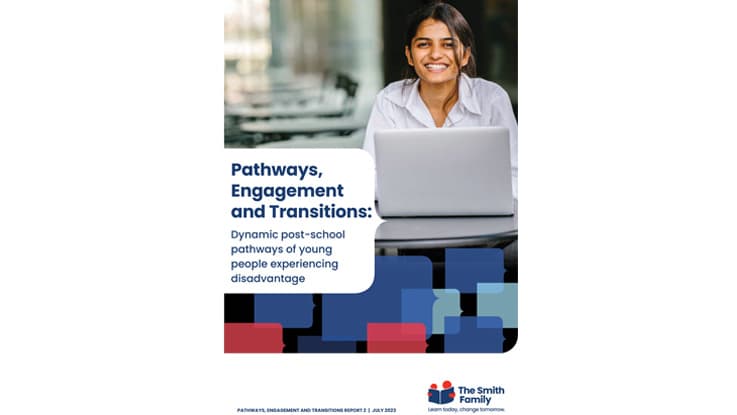
Pathways, Engagement and Transitions: Most young people experiencing disadvantage engaged in post-school work or study, but concerns remain for future careers
A longitudinal study on the post-school transitions of young people experiencing disadvantage has found that while the vast majority are engaged in work or study two years after finishing school, they are missing out on career progression opportunities which could have long-term consequences for their futures.
A particular strength of the PET study is that it is hearing directly from young people on these matters. Over three years (2021–2023), PET is following two cohorts of young people experiencing disadvantage. These young people were in Year 10 or Year 12 in late 2020 and on The Smith Family’s long-term educational scholarship program, Learning for Life.
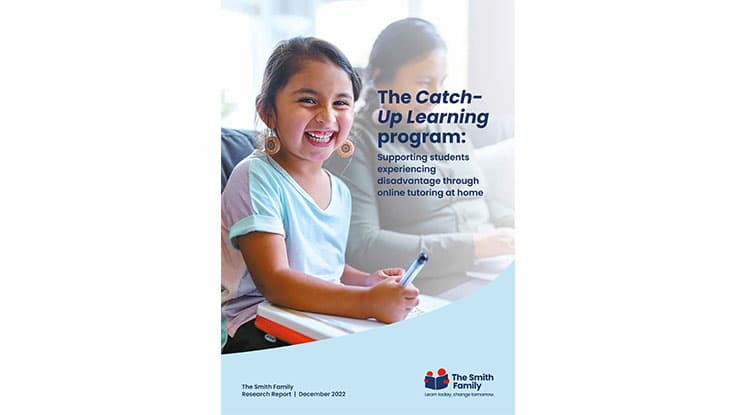
The Catch-Up Learning Program: Supporting students experiencing disadvantage through online tutoring at home
The second trial of an online in-home tutoring program run by The Smith Family has again achieved strong results for children struggling with numeracy and literacy.
The Catch-Up Learning program first ran in 2021 in response to the COVID-19 pandemic and aimed to contribute to addressing the gap in educational achievement between students experiencing disadvantage and their more advantaged peers.
This larger second trial and evaluation of the program was undertaken in 2022, supported by funding from the Australian Government Department of Education.
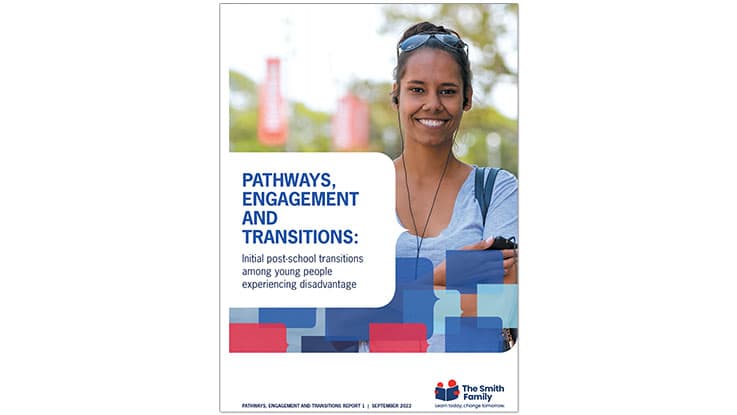
Pathways, Engagement and Transitions: Initial post-school transitions among young people experiencing disadvantage
The Pathways, Engagement and Transitions (PET) study focuses on the experiences of young people experiencing disadvantage. It aims to understand their pathways through work and study over time, the factors that influence these pathways, and what more could be done to strengthen young people’s post-school outcomes.
A particular strength of the PET study is that it is hearing directly from young people on these matters. Over three years (2021–2023), PET is following two cohorts of young people experiencing disadvantage. These young people were in Year 10 or Year 12 in late 2020 and on The Smith Family’s long-term educational scholarship program, Learning for Life.
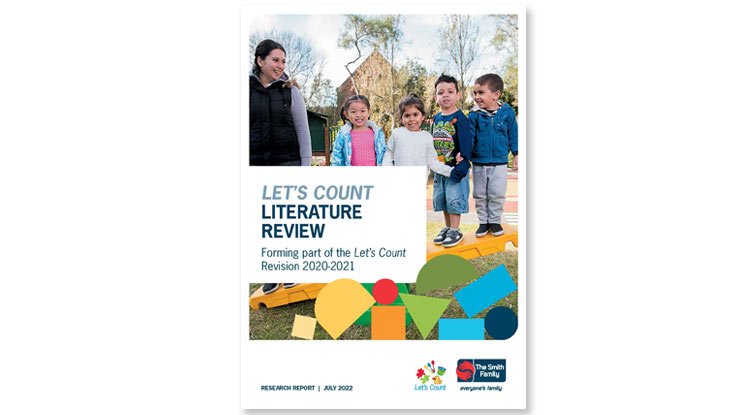
Let’s Count Revision 2020-2021 : Literature Review and Snapshot
In 2020-2021, with the support the Ian Potter Foundation and Equity Trustees – James Raymond Hartley Charitable Trust, we embarked on a journey to review our early numeracy program, Let’s Count. Together with our key stakeholders we reviewed the latest research and developments in early years learning and early years maths learning and Indigenous Knowledge with the aim to ensure that Let’s Count includes the latest learnings, making them inherent in the program as well as making Let’s Count appropriate for all cultural backgrounds.
Part of this work included this Literature Review and it’s subsequent recommendations written by Peridot Education with Appendices from the Stronger Smarter Institute.
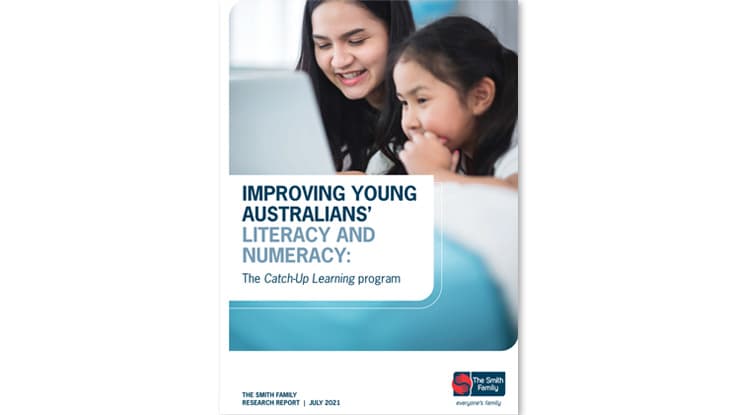
Improving Young Australians' Literacy and Numeracy: The Catch-up Learning program
The Smith Family piloted Catch-Up Learning, an online tutoring program, with qualified teachers providing one-on-one sessions in literacy and numeracy to financially disadvantaged students on The Smith Family’s Learning for Life program. The tutoring occurred in the student’s home.
This small pilot has shown very promising evidence of the program's capacity to engage students and support greater than expected gains in literacy and numeracy. It appears to offer particular value for students who may have previously struggled to attend school for a range of reasons.
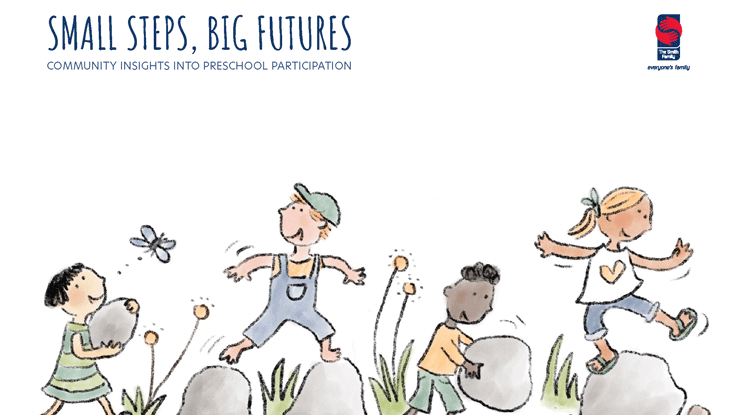
Small Steps, Big Futures Report – Community insights into preschool participation
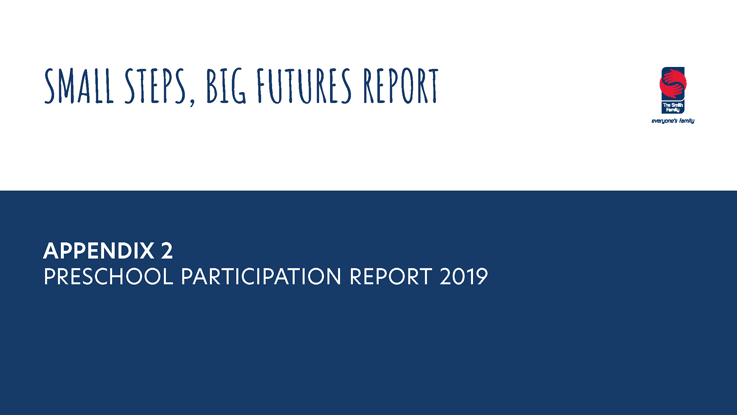
Appendix 2 – Preschool Participation Report 2019
This paper synthesises existing research and documents programs and practice in Australian jurisdictions to increase preschool participation. The Preschool Participation Report formed part of the Project Interim Report that was completed in December 2019. It has been included as an appendix in this Small Steps, Big Futures Report as it has been the foundation of this qualitative report.
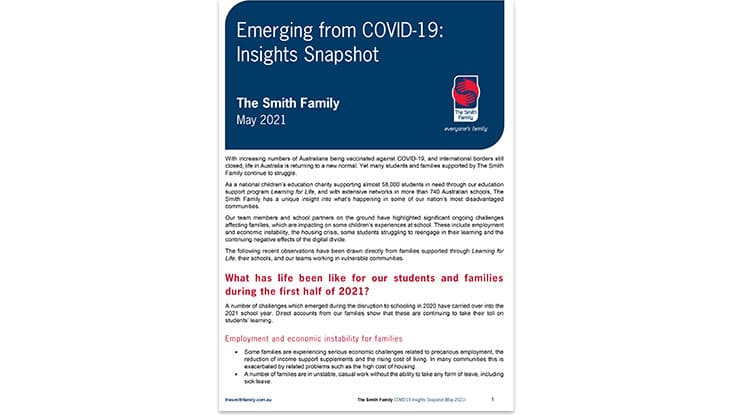
COVID-19 Insights Snapshot, May 2021
With increasing numbers of Australians being vaccinated against COVID-19, and international borders still closed, life in Australia is returning to a new normal. Yet many students and families supported by The Smith Family continue to struggle.
Our team members and school partners on the ground have highlighted significant ongoing challenges affecting families, which are impacting on some children’s experiences at school. These include employment and economic instability, the housing crisis, some students struggling to reengage in their learning and the continuing negative effects of the digital divide.
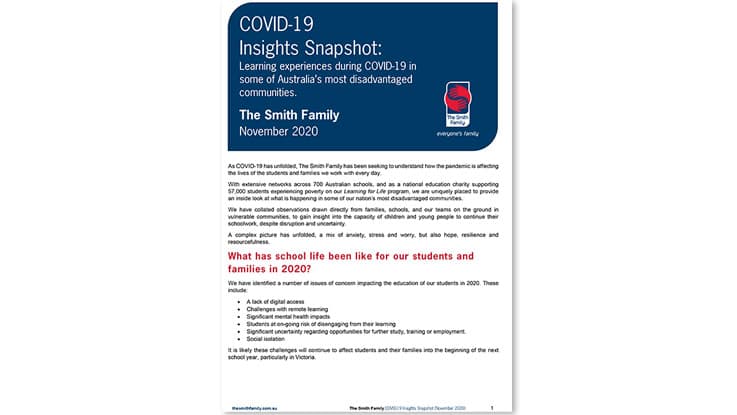
COVID-19 Insights Snapshot, November 2020
This snapshot delves into the on-going impact of COVID-19 on students and families supported by The Smith Family. It brings together observations from families, schools and Smith Family teams on the ground in some of Australia’s most disadvantaged communities, to provide insight into the capacity of children and young people to continue their learning in a year of disruption and uncertainty.
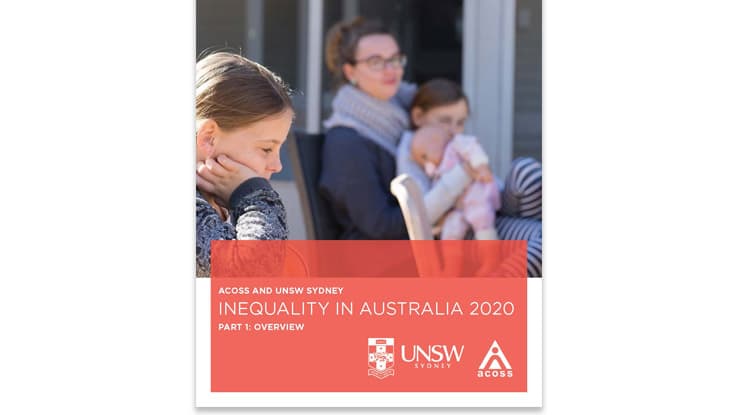
Inequality in Australia 2020 Part 1
This report examines the nature and extent of income and wealth inequality in Australia. It maps it over time and across different households. The Supplement to the Report explores the impact of covid-19 on income inequality. Both the Report and the Supplement were developed by the Australian Council of Social Services (ACOSS) and the Social Policy Research Centre at the University of New South Wales. They are part of series of research reports from a five-year ACOSS-UNSW Poverty Partnership of which The Smith Family is a partner.
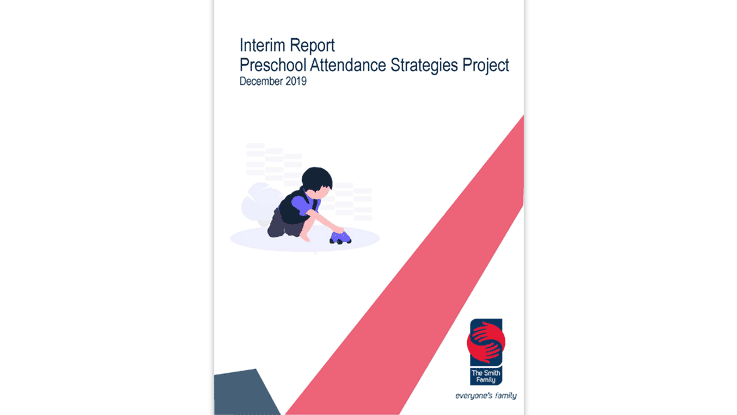
Preschool Attendance Strategies Project Interim Report
This report documents feedback from community consultations conducted in November 2019 about the issues for parents/carers and practitioners that impact on children’s participation in preschool. The report identifies opportunities for the development of potential responses to those issues. A final report will be released at the end of the Project.
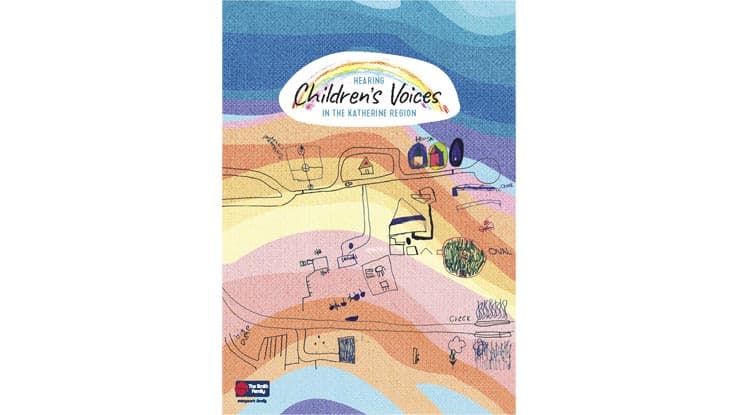
Hearing Children's Voices in the Katherine region
The Hearing Children’s Voices Project explores a different way of working with children in the Katherine Region. It aims to build the ability of children to have their say in a safe and respectful environment and hold a genuine voice within their community. The Katherine Region Communities for Children Facilitating Partner (CfC FP) facilitated this project to ensure our work is connected to and guided by what children think is important.
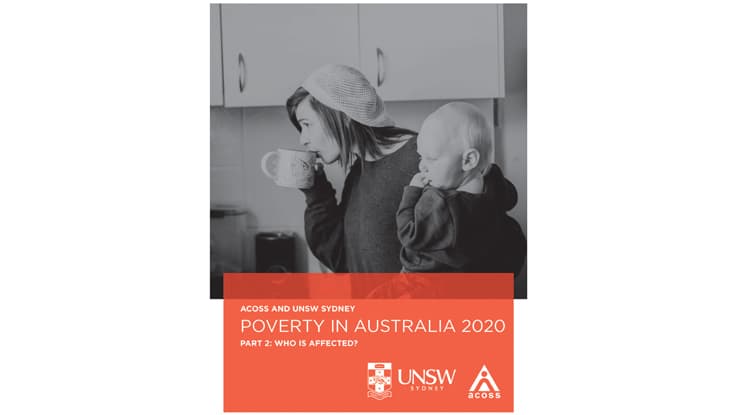
Poverty in Australia (2020) Part 2: Who is affected?
This report provides detail on poverty in Australia using data from the Australian Bureau of Statistics. It analyses the data using a range of characteristics including gender, family type, main source of income and labour force status.
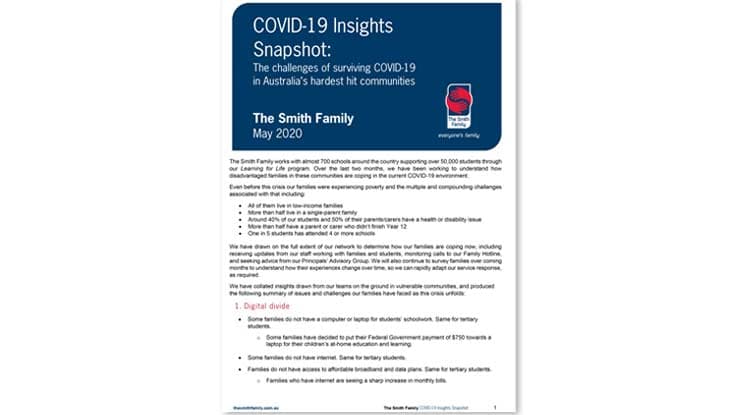
COVID-19 Insights Snapshot, May 2020
This report summarises how students and families supported by The Smith Family are being impacted by COVID-19. It draws on our networks of students, families, staff and schools and identifies key themes as well as some of the responses needed to minimise the longer-term impact on vulnerable students of COVID-19.
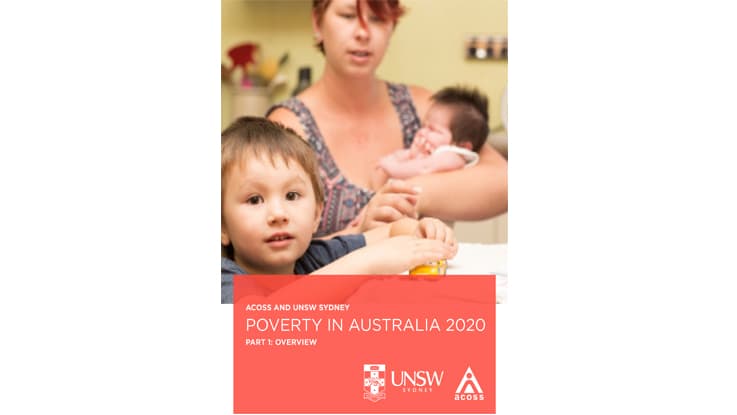
Poverty in Australia (2020) Part 1: Overview
This report shows the proportion of all people and children living in poverty in 2017-18, and provides information about the main drivers of changes in poverty including trends in overall household disposable incomes, social security payment rates, and housing costs. This report is the latest in the Poverty in Australia series, part of the Poverty and Inequality Partnership between ACOSS and UNSW (Sydney) of which The Smith Family is a partner.
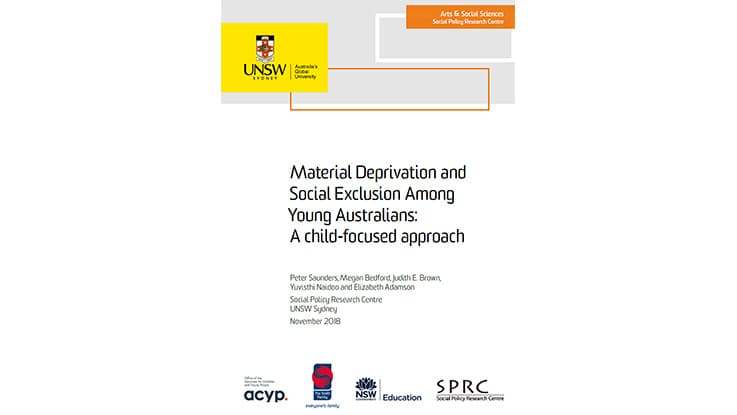
Material Deprivation and Social Exclusion Among Young Australians: A child-focused approach
This is the full report and snapshot from a pioneering study which explores poverty and disadvantage through the lens of young Australians themselves. It explores what they see as the essential things and activities that all young Australians should have and do. It estimates the proportion of young people, including those from disadvantaged backgrounds, who don’t have one or more of these essential items, and reports on the impact of this on a range of areas of their life, including wellbeing and engagement with school. It helps to make concrete what poverty and disadvantage look like for young Australians.
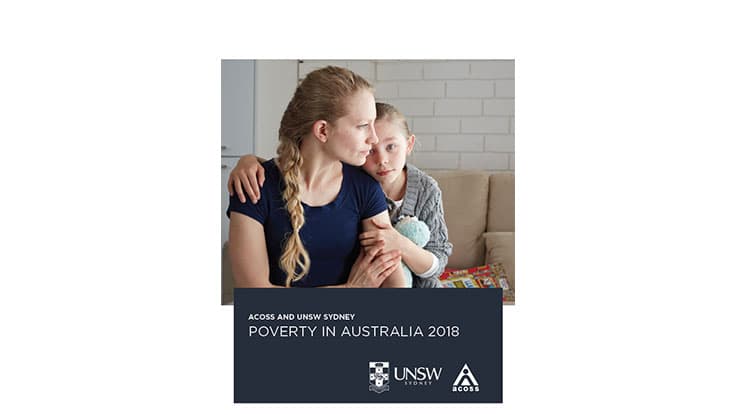
Poverty in Australia (2018)
This report examines the nature and extent of poverty in Australian society. It looks at the rates of poverty across different households, and different sections of the community. The report was developed by the Australian Council of Social Services (ACOSS) and the Social Policy Research Centre at the University of New South Wales. It is the second in a series of research reports from a five-year ACOSS-UNSW Poverty Partnership, established in 2018, of which The Smith Family is a partner.
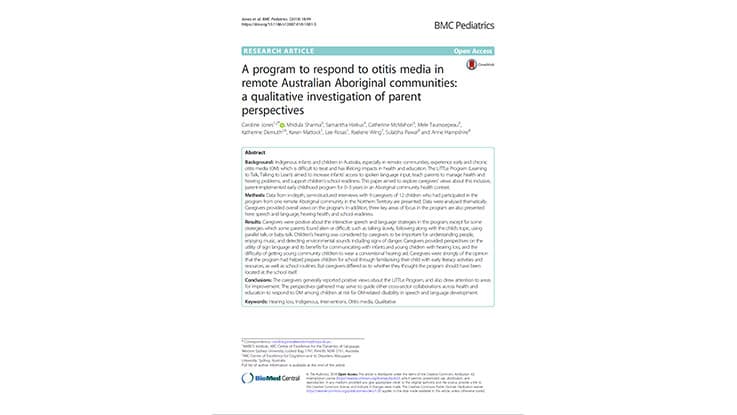
A program to respond to otitis media in remote Australian Aboriginal communities: a qualitative investigation of parent perspectives
Indigenous infants and children in Australia, especially in remote communities, experience early and chronic ear infections which are difficult to treat and have lifelong impacts on health and education. The LiTTLe Program (Learning to Talk, Talking to Learn) aimed to increase infants’ access to spoken language input, teach parents to manage health and hearing problems, and hence support children’s school readiness. This paper aimed to explore caregivers’ views about this inclusive, parent-implemented early childhood program for 0–3 years in an Aboriginal community health context.
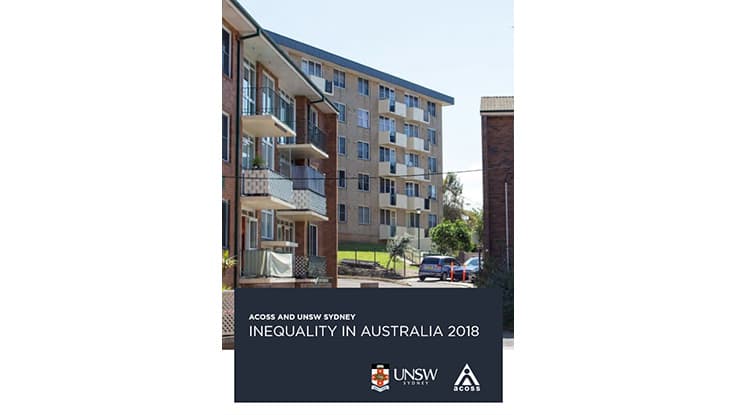
Inequality in Australia (2018)
This report examines the nature and extent of inequality in Australian society. It maps income and wealth inequality over time across different households. It also compares inequality in Australia to comparable OECD nations like the US and UK. The Report was developed by the Australian Council of Social Services (ACOSS) and the Social Policy Research Centre at the University of New South Wales. It is the first in a series of research reports from a five-year ACOSS-UNSW Poverty Partnership, established in 2018, of which The Smith Family is a partner.
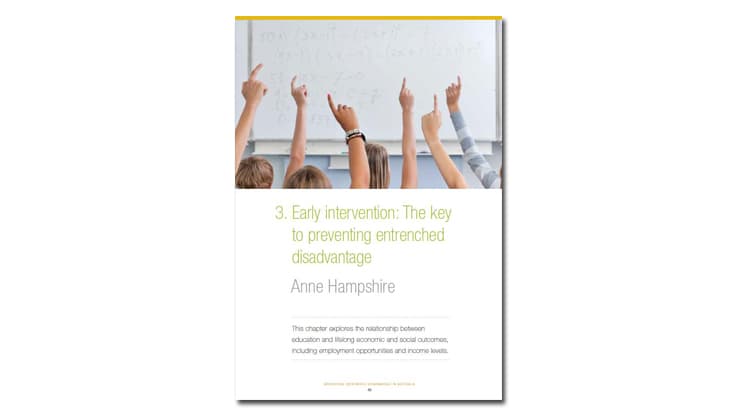
Addressing entrenched disadvantage in Australia, Report by CEDA, Chapter 3: Early intervention - The key to preventing entrenched disadvantage
This chapter, written by The Smith Family's Head of Research and Advocacy Anne Hampshire, is featured in Addressing entrenched disadvantage in Australia, a research report published by The Committee for Economic Development of Australia (CEDA) in April 2015. The chapter highlights that improving the educational outcomes of disadvantaged children and young people is the most cost-effective approach to breaking the cycle of disadvantage. It’s far more efficient than later outlays on income support and remediation efforts targeted at building the skills of adults who are unable to secure employment or participate in society more broadly.
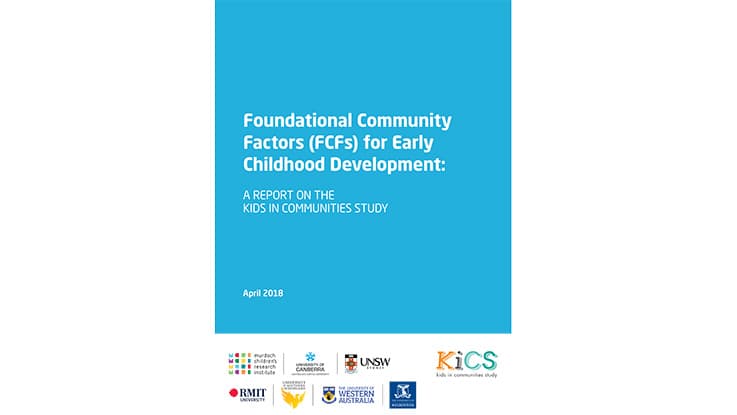
Kids in Communities Study Final Report
This report summarises a series of promising foundational community factors (FCFs) for early childhood development. It is based on findings from the Kids in Communities Study (KiCS). FCFs are the community-level factors that lay the foundations of a good community for young children. KiCS was undertaken through an Australian Research Council Linkage Grant and led by The University of Melbourne, in partnership with a range of other universities, Federal and State Government Departments and non-government organisations, including The Smith Family. Further information on this project is available at www.mcri.edu.au/research/projects/kids-communities-kics-3/publications
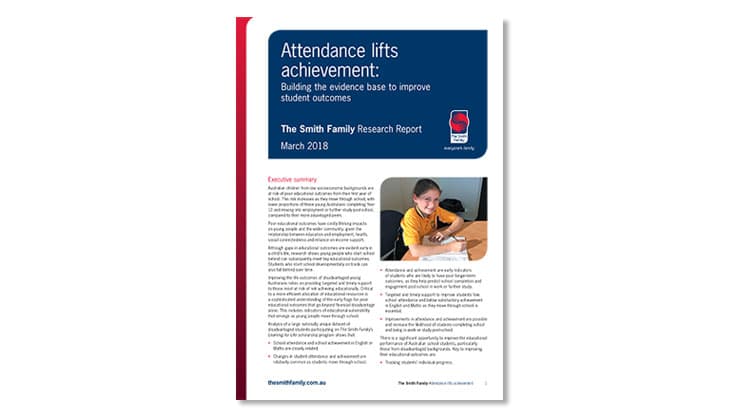
Attendance lifts achievement: Building the evidence base to improve student outcomes
Australian children from disadvantaged backgrounds are at risk of poor educational outcomes from their first year of school. This risk increases as they move through school. There is significant opportunity to improve their educational outcomes and post-school prospects. Key is tracking students’ individual progress, and using evidence to identify, as early as possible, students needing additional support to achieve.
The findings in this publication are an Australian first, based on data from 30,000 disadvantaged students supported through The Smith Family’s long-term educational scholarship program, Learning for Life. This research contributes to ongoing national efforts to improve the educational outcomes of young Australians, particularly those from disadvantaged backgrounds.
Download full report [PDF 6.1MB]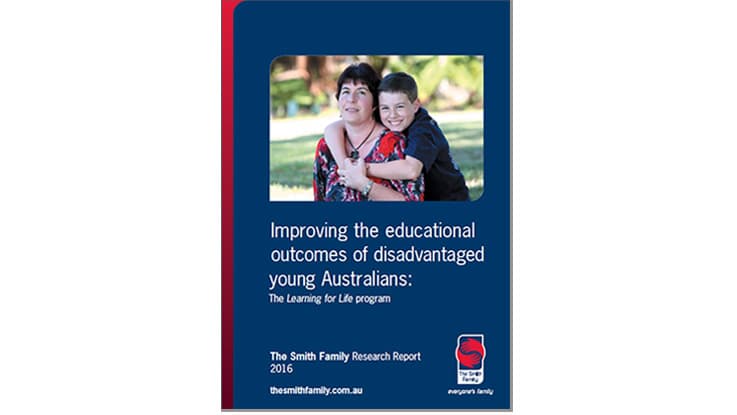
Improving the educational outcomes of disadvantaged young Australians: The Learning for Life program
Australia faces significant educational challenges if it’s to remain globally competitive and socially cohesive. Large gaps in educational achievement, based on students’ backgrounds, are apparent in the first year of school. These gaps grow as young people move through school, resulting in large proportions of young adults from disadvantaged backgrounds not positively transitioning to employment or further study.
This report presents new data that highlights the success of The Smith Family’s Learning for Life program in improving the educational outcomes of highly disadvantaged Australian students.
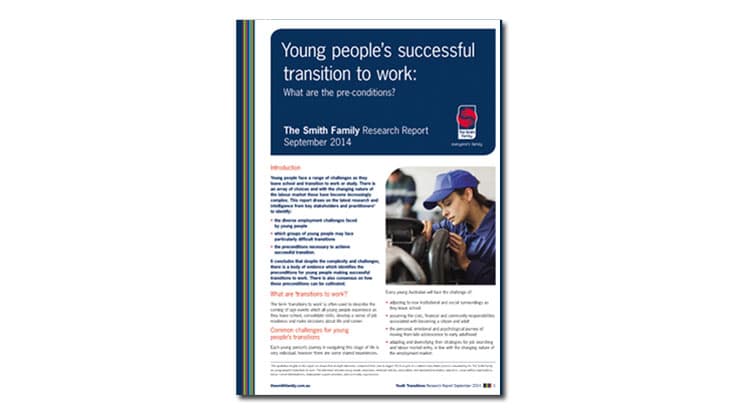
Young People’s successful transition to work: What are the pre-conditions?
This report draws on the latest research and intelligence from key stakeholders and practitioners to identify the challenges faced by young people in today’s complex and ever changing labour market. It aims to identify which groups of young people face particularly difficult transitions between school and work, and the preconditions necessary to achieve successful transition. The report concludes that despite the complexity and challenges, there is a body of evidence which identifies these preconditions and how they can be developed.
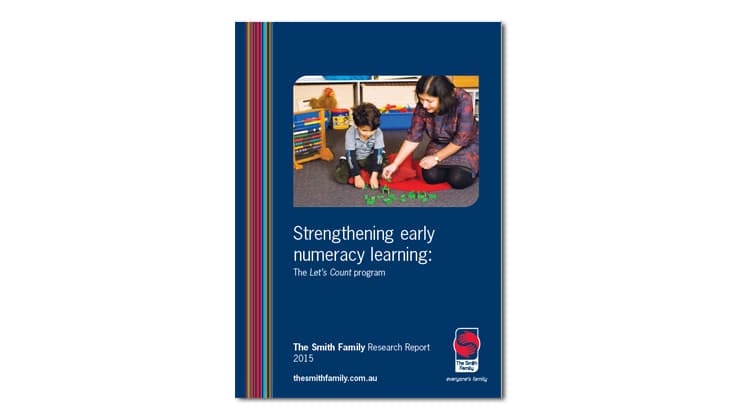
Strengthening early numeracy learning: The Let's Count program
Australia is facing a serious numeracy challenge, particularly among disadvantaged children, with many not developing the maths skills needed for economic and social participation. This research report demonstrates that The Smith Family’s early maths program, Let’s Count, has had a positive impact on the mathematical skills and confidence of the children, parents and educators who participated. Children who were involved in Let’s Count developed much stronger maths skills than their peers who didn’t participate.
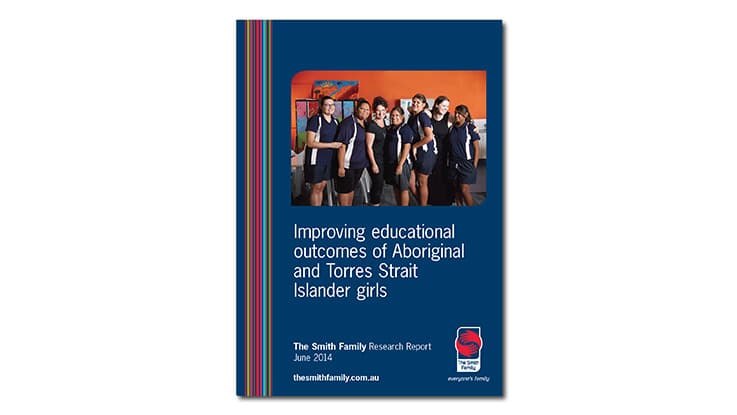
Improving educational outcomes of Aboriginal and Torres Strait Islander girls
Research suggests that increasing the educational outcomes achieved by young women from Aboriginal and Torres Strait Islander backgrounds is particularly important to not only them, but their families and communities, as women are often instrumental in bringing about social change in disadvantaged communities (WHO 2014). This report looks at an independent evaluation of The Smith Family’s Girls at the Centre program and its outcomes to achieve improvements in school attendance rates and community engagement.
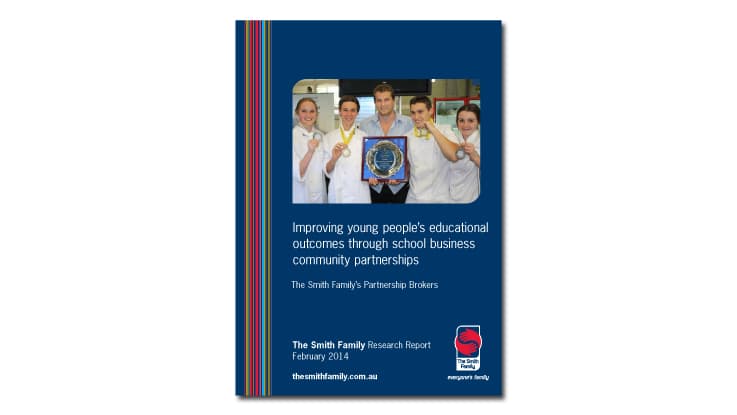
Improving young people’s educational outcomes through school business community partnerships: The Smith Family’s Partnership Brokers
This report showcases some of the innovative and effective partnerships that have been developed around Australia by The Smith Family through the Commonwealth Government funded School Business Community Partnership Brokers program. The partnerships bring together educational institutions, business, community organisations and other key stakeholders to support improved education, transition and employment outcomes for young people.
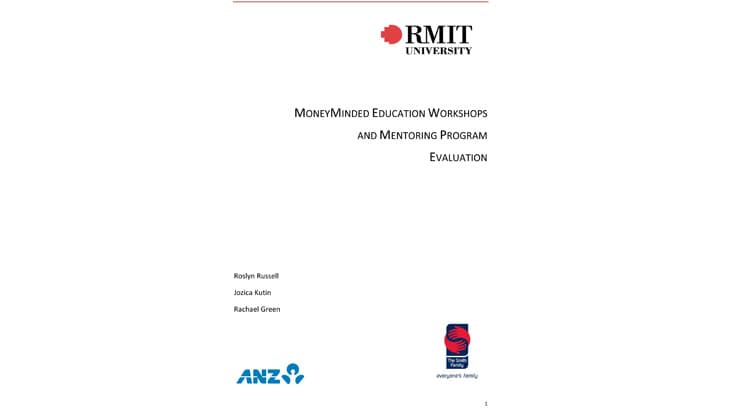
MoneyMinded Education Workshops and Mentoring Program Evaluation
This report provides the evaluation results of the MoneyMinded education workshops and mentoring pilot program developed by The Smith Family (TSF) and ANZ.
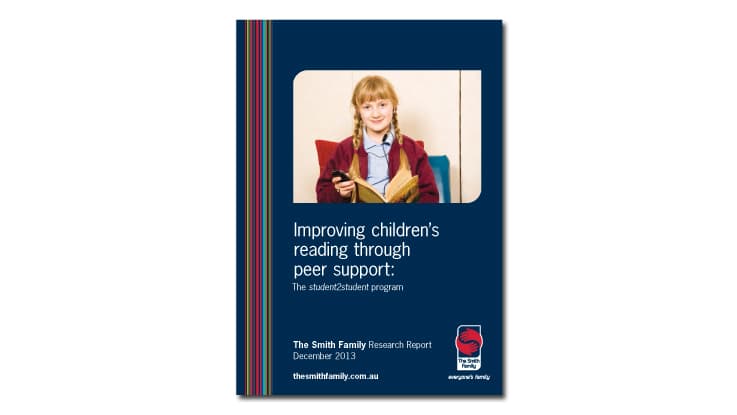
Improving children’s reading through peer support: The student2student program
This report outlines findings from a study of 742 participants in The Smith Family’s student2student reading program. It reveals that 93 per cent improved their reading skills with two-thirds boosting their reading age by more than six months.
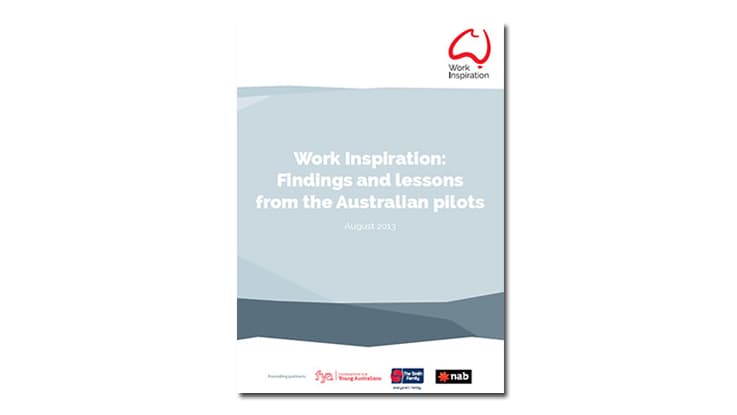
Work Inspiration: Findings and lessons from the Australian pilot
This report outlines the findings and lessons from 14 Australian pilots of the Work Inspiration initiative. Work Inspiration is an employer-led initiative that aims to ensure young Australians’ first experience of the world of work is meaningful and inspiring.
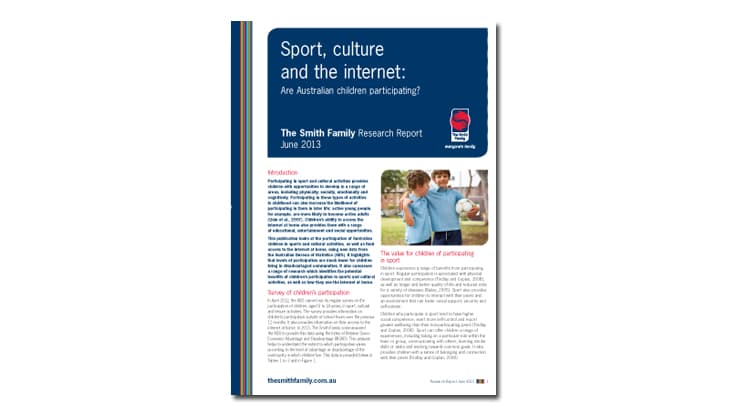
Sport, culture and the Internet: Are Australian children participating?
Research shows significant numbers of children living in disadvantaged communities are not participating in sport and cultural activities that are critical to their development. This report uses unpublished data from the Australian Bureau of Statistics' Survey of Children's Participation in Cultural and Leisure Activities and highlights how involvement varies according to the type of community in which a child lives.
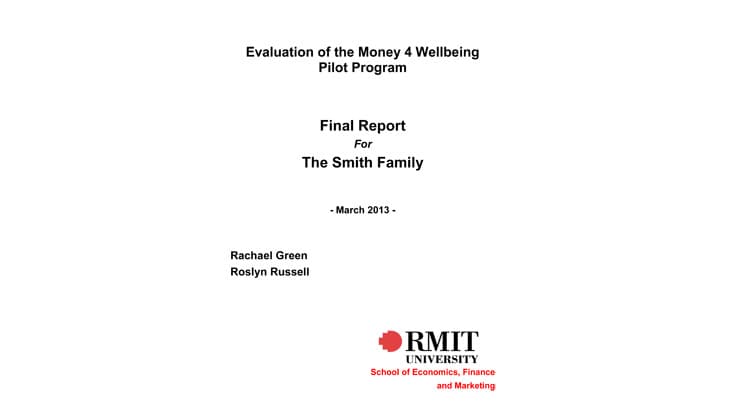
Evaluation of the Money 4 Wellbeing Pilot Program
This report provides an evaluation of The Smith Family’s Money 4 Wellbeing pilot program. The program aimed to improve the financial capability of young people aged between 18 and 24 who were from disadvantaged backgrounds.
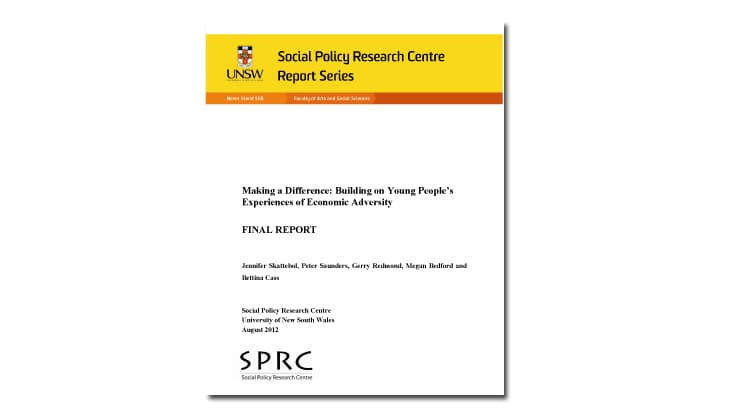
Making a Difference: Building on Young People's Experiences of Economic Adversity
As one of the first Australian studies to consider the real experience of economically disadvantaged young people, this qualitative study documents how young people experience exclusion in the family, at school and in their communities. It involved more than 130 interviews with children and young people (aged between 11 and 17 years) in NSW, Victoria and South Australia and their parents, teachers and service providers. The report provides a unique and rare view into the lived experience of children, how they cope with disadvantage and what they think can be done about it.
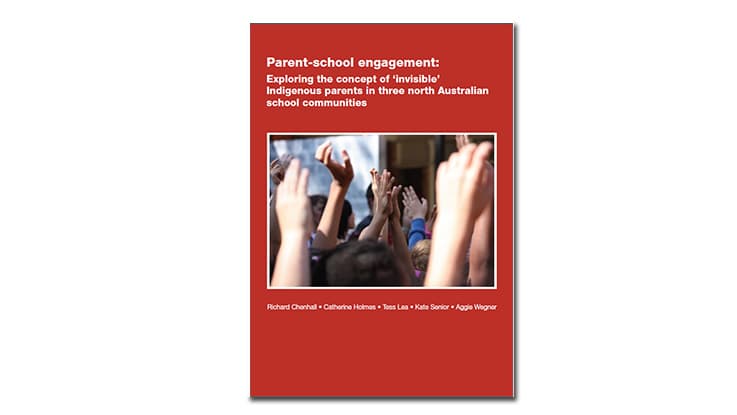
Parent-school engagement: Exploring the concept of 'invisible' Indigenous parents in three north Australian school communities
This report explores school-parent engagement in three town-based schools in the Northern Territory. Undertaken over a three year period between 2008 and 2010, the research team worked in partnership with The Smith Family and participating schools to explore what parents have to say about the schools that their Indigenous children attend and about education more broadly.
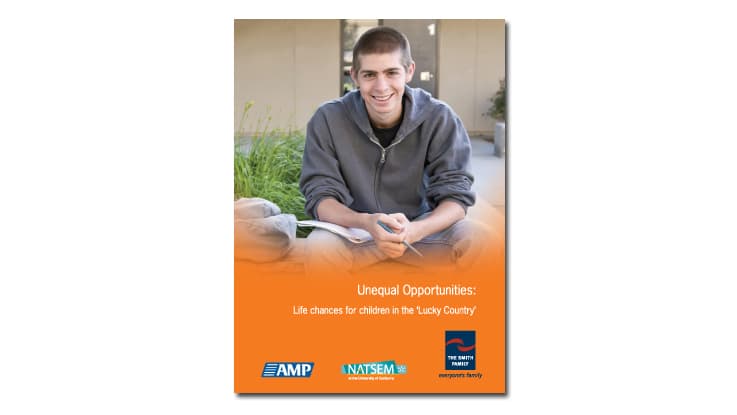
Unequal Opportunities: Life chances for children in the 'Lucky Country'
New research questions whether Australia really is the 'lucky' country – the land of the 'fair go' where children are able to reach their potential regardless of their background. This AMP funded report looks at factors influencing children's life chances in Australia.
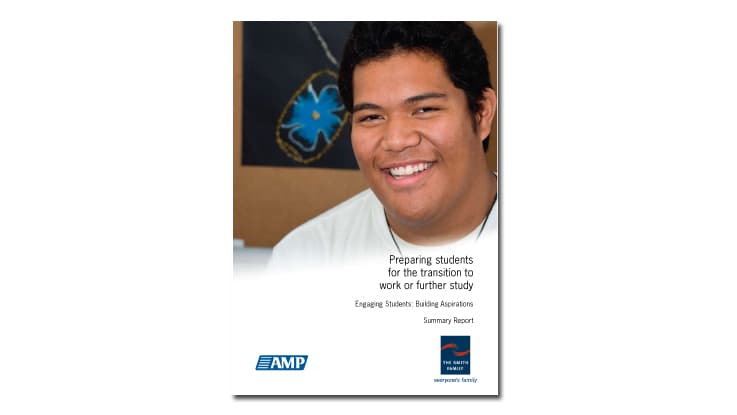
Preparing students for the transition to work or further study
This literature review provides a comprehensive analysis of national and international research to assist with the development of an evidence-based model to support students in Years 8-10 (13-16 years) as they progress through school into work or further study.
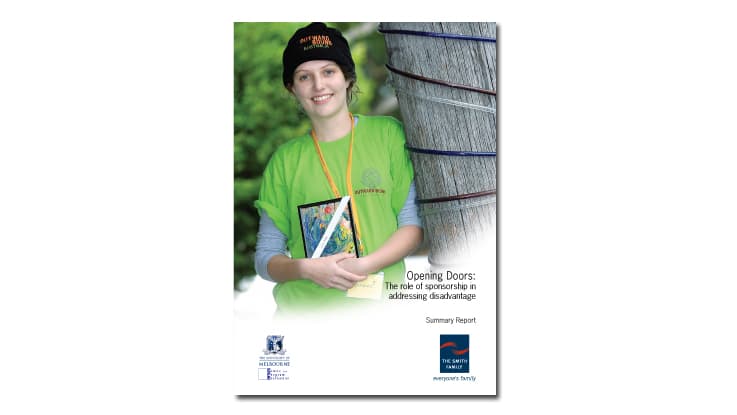
Opening doors: the role of sponsorship in addressing disadvantage
This report looks at the role of financial assistance in breaking the cycle of disadvantage for Australian children, using the example of a sponsorship model that works to help these individuals remove the many barriers they face.
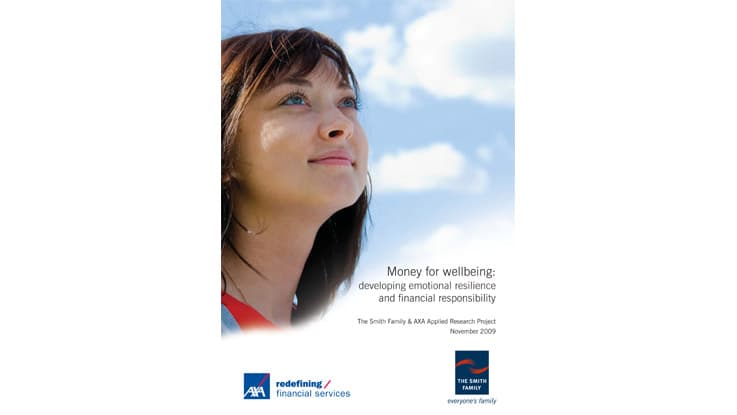
Money for Wellbeing: developing emotional resilience and financial responsibility
This literature review informed the development of the Money 4 Wellbeing pilot program. The review provides an understanding of the psychological and social aspects of financial behaviour and how these can be transformed.
Participation research
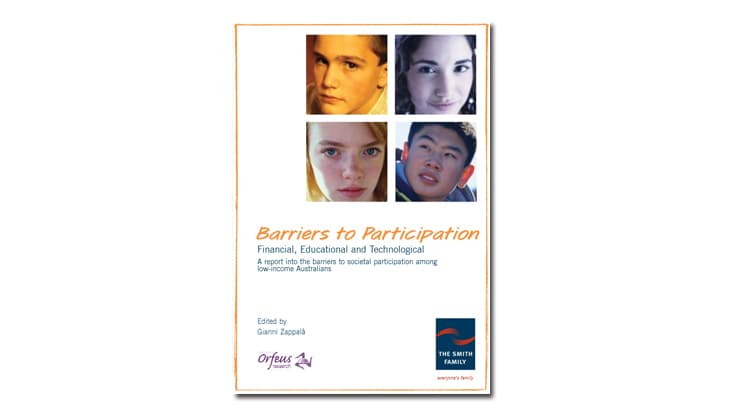
Barriers to participation: financial, technological, educational
This Smith Family report examines the barriers to societal participation among low-income Australians.
Home to school transitions research
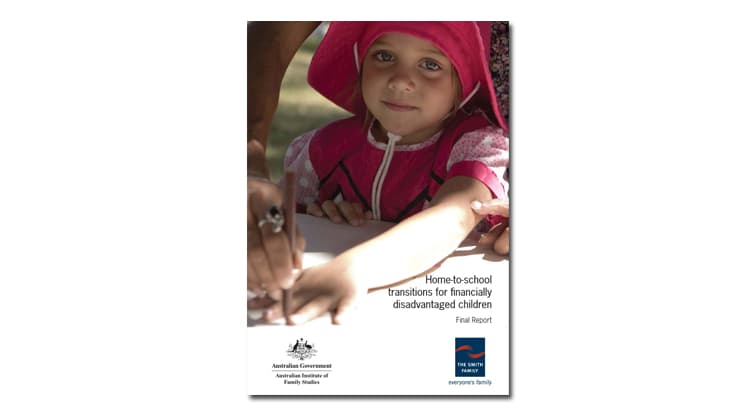
Home-to-school transitions for financially disadvantaged children
This Smith Family report seeks to identify the factors that facilitate or impede the school transitions of Australian children from financially disadvantaged families.
School to work transitions research
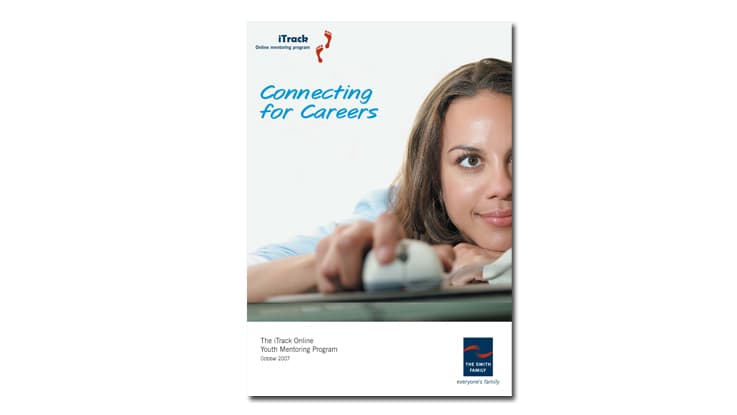
Connecting for Careers: iTrack evaluation report
An evaluation of the pilot program run for iTrack (previously called 'On-Track'), The Smith Family’s online mentoring program focusing on the school to work transition.
Download full report [PDF 0.5MB]
Australian Young People: Their stories, their families and post-school plans
This Smith Family report investigates the effects and influences of family expectations on the cost benefit analyses undertaken by students when they are considering their post-school plans.
Download full report [PDF 0.3MB]
On track? Students choosing a career
This report is the fourth in a series from The Smith Family examining the post-school plans of young people.
Download full report [PDF 5.3MB]
What do students know about work?
This report stems from a previous Smith Family report – Post-school Plans: aspirations, expectations and implementation – which indicated that the post-school plans of young people were important for understanding their educational and occupational aspirations.
Download full report [PDF 3.0MB]
What do students think of work?
What do students think of work? Are they on the right page? This Smith Family report provides an insight into junior secondary student perceptions of school, work, and vocation.
Download full report [PDF 2.0MB]
Post school plans: aspirations, expectations and implementation
This report was prepared for The Smith Family by the Australian Council for Educational Research and investigates the relations between post-school plans, family background and having a lifelong learning orientation.
Education research
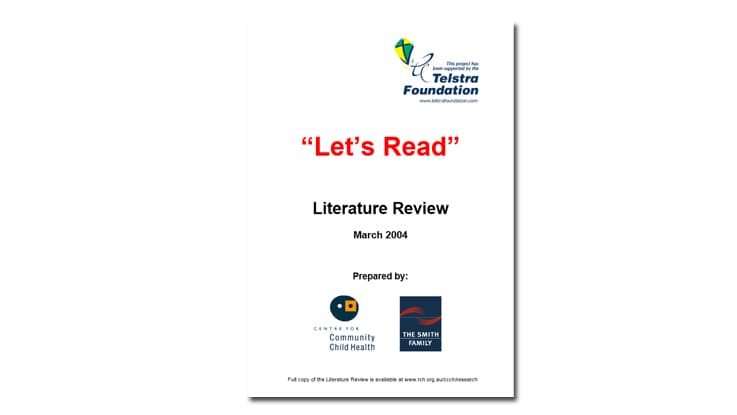
Let’s Read Literature Review
The literature review describes the evidence base linking poor literacy to poverty and lower health and education outcomes. It outlines the research that has examined the impact of book reading in very early childhood in preparation for developing and acquiring language and literacy skills.
Download literature review [PDF 0.5MB]
Emotional literacy: Building strong relationships for lifelong learning
This snapshot report discusses the importance of emotional literacy, not just in supporting children and young people to build strong relationships now, but as the essential precursor to their broader academic and economic achievements in the future.
Download full report [PDF 1.2MB]
How is learning enhanced through improved health and nutrition?
This literature review examines key health issues impacting on the learning of children from culturally and linguistically diverse (CALD) and Indigenous backgrounds.
Digital literacies research
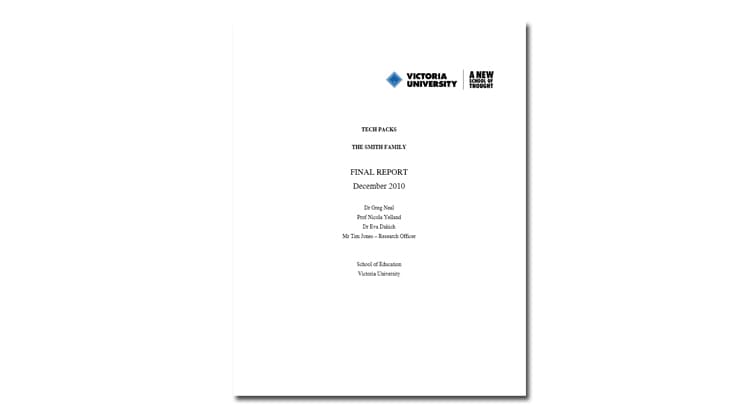
Tech Packs evaluation report
This report by the School of Education at Victoria University Melbourne provides an independent evaluation and review of The Smith Family’s Tech Packs initiative.
